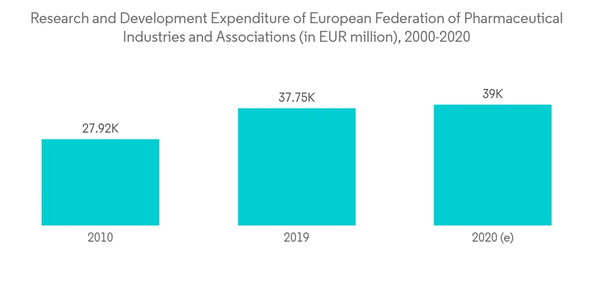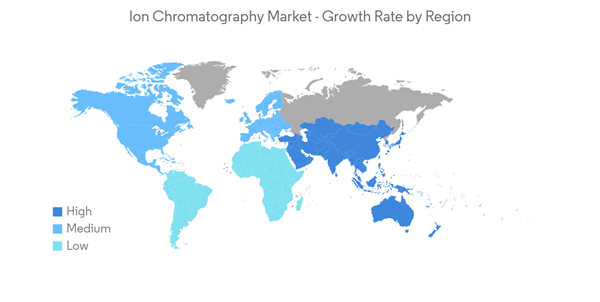Covid-19 has significantly impacted the ion chromatography market growth due to the rise in vaccine production. For instance, according to the study titled 'Highly Efficient Purification of Recombinant Vaccine against SARS-CoV-2 by Flow-Through Chromatography' in September 2021, the use of ion chromatography results in strong binding of the virus to the media, necessitating a high salt concentration for elution. Therefore, ion chromatography has been used in the Covid-19 vaccine production process because of the significant binding of the virus to the medium. This might have led to increased adoption of ion chromatography during the pandemic, driving market growth.
The factors driving the growth of the ion chromatography market include increasing academic and commercial R&D spending on pharmaceutical development, a rise in technological advancements, and increasing adoption of ion-exchange techniques in the food, beverage, and water industries. to check content, quality, or safety, among others. The ion-exchange technique is also being used to check the presence or amount of ingredients in a sample.
Furthermore, according to the study titled 'Non-aqueous Ion-Exchange Chromatography Using High Acid-base Concentration: A Strategy for Purifying Non-crystalline Pharmaceutical Intermediates' in March 2021, ion-exchange chromatography (IEX) is used in non-aqueous mobile phases to purify a non-crystalline intermediate after a reductive amination with D-xylose with strength and purity of the intermediate allowing successful downstream processing. The importance of ion chromatography in pharmaceutical production is therefore expected to drive the market growth due to the high adoption of this process in pharmaceutical industry.
The growth of the global ion chromatography market is due to the increasing use of ion-exchange chromatography for purification, along with the increasing demand for monoclonal antibodies, which is a primary driver for the market.
In addition, according to the Congressional Budget Office in April 2021, during the past two decades, USD 700 billion in federal funding has been provided to the National Institute of Health (NIH). A significant portion of such money has gone toward supporting fundamental studies in genomics, molecular biology, and other life sciences that have discovered novel disease pathways. The funding for the NIH increased by real annual increases, reaching USD 41 billion in 2020. The rising funding for the research and development in fundamental research will therefore lead to the adoption of ion chromatography in R&D, driving market growth.
However, the high cost of chromatography instruments and the lack of skilled personnel to handle the equipment are hindering the growth of the ion chromatography market.
Ion Chromatography Market Trends
Application in Pharmaceutical Industry is Expected to Exhibit Fastest Growth Over the Forecast Period
Ion chromatography is the most widely used analytical technique in the pharmaceutical industry for characterizing new drug substances and drug products. It is applied from the method development to the dose analysis. In recent years, the technique has made the sample analysis less painful. This procedure immensely saves time and money since it can be run overnight with numerous samples. The analysis can be either for small molecules or large molecules like proteins.Many global players are investing their significant revenues in the drug discovery and development process to bring novel molecules to the market. Besides this, various national governments are supporting these pharma giants by funding billions of dollars in the process of drug discovery and development in order to combat chronic diseases such as cancers and other metabolic disorders. In addition, there are numerous applications of ion exchange chromatography that extend from the separation of inorganic cations and anions to organic entities such as amino acids, peptides, proteins, and nucleosides.
Furthermore, the global pharmaceutical players are also providing research grants to pace up innovative research in challenging areas. For instance, in 2021, Merck KGaA distributed several research funds to encourage creativity in difficult but crucial areas. Grants between EUR 40,000 and 450 000 euros have been awarded for up to three years in the different areas of research of which, drug discovery has 3 grants totaling EUR 350,000 per year, renewable for an additional three years. Such high research and development expenditure by the pharmaceutical companies will therefore lead to increased adoption of ion chromatography in pharmaceutical industry for the downstream processing, driving this segment growth.
Therefore, owing to the above mentioned factors, the pharmaceutical segment is expected to show a significant growth over the forecast period.
North America Captured a Significant Market Share and is Expected to Retain its Dominance over the Forecast Period
In the United States, ion chromatography is used for many applications. Ion chromatography (IC) has proven to be an effective technology for final production testing, pharmaceutical applications, environmental monitoring, food testing, and other applications. The United States Pharmacopeia (USP) is a non-government not-for-profit organization that supports itself through the sale of books (USP-NF and other publications) and reference standards. USP sets standards for the use of ion chromatography in pharmaceutical applications. Many organizations, such as USEPA (United States Environmental Protection Agency), ASTM (American Society for Testing and Materials), and AOAC (Association of Official Analytical Chemists) are some of the additions to the market in the United States. These organizations also develop standards or regulatory methods of analysis for various applications of ion chromatography.Furthermore, the developed infrastructure, and strong foothold of key market players such as Thermofisher, Bio-Rad, Perkin Elmer, and GE Healthcare, among others, and their strategies will lead to the development of innovations in ion chromatography in this region, thereby leading to drive the market growth. For instance, in March 2021, Bio-Rad launched BabyBio IEX Screening Kit and BabyBio Peptide Purification Kit, that are pre-packed, ready-to-use ion exchange chromatography columns for easy and convenient purification of proteins, peptides and oligonucleotides by utilizing the difference in the surface charge of the target molecule. Therefore, such initiatives will lead to rise in adoption of ion chromatography in food industry, driving the market growth.
In addition, according to the study titled 'An Ion Chromatography Method for Simultaneous Quantification of Chromate, Arsenate, Selenate, Perchlorate, and Other Inorganic Anions in Environmental Media' in July 2021, the ion chromatography method was applied to track Chromium (VI) and other anion concentrations in laboratory batch microcosms experiments with soil, surface water, and anaerobic medium effectively. The rising application of Ion Chromatography will therefore lead to rise in adoption of this techniques in the United States, driving the market growth.
Therefore, ion chromatography has varied and diverse applications in food, pharmaceutical, environmental industries, which lead to the growth of this market in North America.
Ion Chromatography Industry Overview
The market for ion chromatography is moderately competitive. The majority of the ion chromatography instruments are being manufactured by the global key players. Market leaders with more funds for research and a better distribution system have established their position in the market. Some of the major players in the ion chromatography market that are disrupting the market by launching several new products include, Agilent Technologies, Bio-Rad Laboratories Inc., Danaher Corporation, Metrohm AG, and Mitsubishi Chemical Corporation, among others.Additional Benefits:
- The market estimate (ME) sheet in Excel format
- 3 months of analyst support
This product will be delivered within 2 business days.
Table of Contents
Companies Mentioned (Partial List)
A selection of companies mentioned in this report includes, but is not limited to:
- Agilent Technologies Inc.
- Bio-Rad Laboratories Inc.
- GE Healthcare
- Metrohm AG
- Mitsubishi Chemical Corporation
- Perkin Elmer Inc.
- Shimadzu Corporation
- Thermo Fisher Scientific
- Tosoh Corporation
- Waters
- Qingdao Shenghan
- MembraPure GmbH










